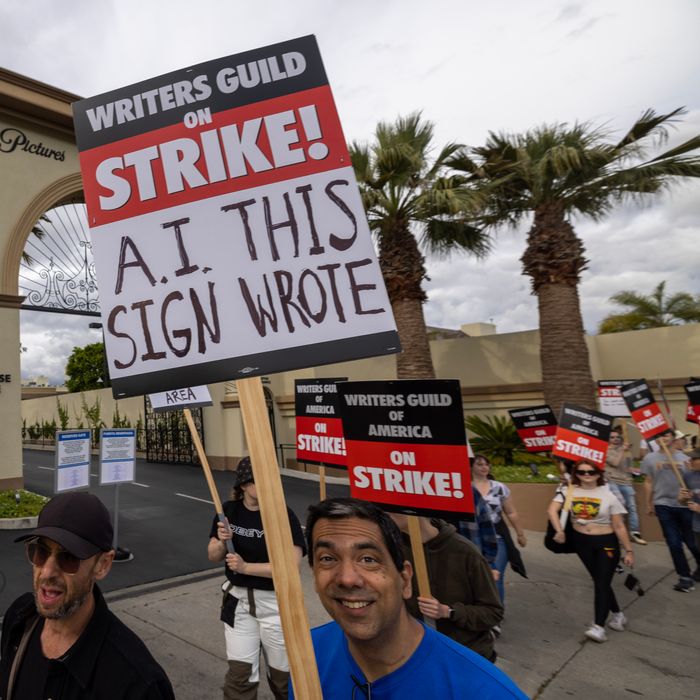
Photo: David McNew/Getty Images
By now you’ve heard of some of the potential threats posed by artificial intelligence. There are the speculative threats, near and far: AI as the job destroyer that could lead to mass white-collar unemployment; AI as the superintelligence-in-waiting with a destiny to kill us all. There are the imminent and even extant threats: The mass automation of bias, the weaponization of synthetic media, the further consolidation of tech power, human impersonation to malign ends. These describe the possible risks of AI as a phenomenon, as a group of tools, and as a well-funded project. They’re what people are worried AI might do, or be used to do, as its boosters proclaim about a glorious and inevitable future with the machines.
But there’s another species of AI threat that’s been rearing its head lately, as the debates around it have become more intense, personal, and immediate — most recently in the context of the Writers Guild strike, in which tools like ChatGPT are playing a central role. These are AI threats made by people, against people, in which the specter of AI is wielded like a weapon. You can see them burbling up in responses to strike news:
Vaguer threats, attributed to Hollywood big shots, are being laundered into Hollywood trade publications:
[An executive push for A.I.] is already happening, according to Amy Webb, founder and CEO of Future Today Institute, which does long-range scenario planning and consultation for Fortune 500 companies and Hollywood creatives. She notes, “I’ve had a couple of higher-level people ask, if a strike does happen, how quickly could they spin up an AI system to just write the scripts? And they’re serious.”
Triumphalist takes along similar lines — someone or something is done for or doomed or better brace itself — have surfaced whenever new-media generators become available:
And in what is perhaps the genre’s defining post, a collage of cartoonish AI-generated bikini-clad women is tagged with the caption “It is SO over.” The “it” here wasn’t clearly defined — Women? Human desire? Some sort of incel concept of the sexual economy? — but viewers got the idea: Whoever or whatever this odd internet stranger didn’t like, AI was coming for it. It’s AI as a reckoning, a punisher, a revealer of frauds. It’s AI as a future vindicator of their hunches about how the world works, and as an extension of their politics. It’s AI as a cleansing force that humbles your enemies and proves you right — AI as economic rapture. It’s AI as your army-in-waiting just over the horizon, your punishing angel, or maybe just as the thing that’s going to embarrass the people who annoy you online. A lot of sunnier AI speculation is clearly wish fulfillment, and so is this. AI is my big, strong friend, and he’s going to beat you up.
Such threats usually don’t have much to say about the important matters of what AI is or is capable of doing, because they’re not about that — they’re about assimilating the concept of an imminent AI into an existing worldview. And obviously they take on different meanings in different contexts. IBM’s CEO suggesting the company is going replace thousands of jobs with AI is both a clever bit of marketing for a company that sells AI products and, perhaps, a reminder to employees not to get too comfortable or demanding — corporate owners pointedly implying that their workforces could potentially be automated or outsourced has been a source of power for centuries, and it’s at the core of many labor disputes, but it’s nonetheless striking. Meanwhile, a Twitter rando with an $8 check mark telling a striking TV writer that she should be replaced with a chatbot is basically just heckling, in the tradition of telling laid-off journalists to “learn to code,” or leaving a “go woke go broke” comment on the Bud Light Instagram account.
Still, their meanings are similar, as are their ideological instincts: They see AI as a force for restoring a natural order, for keeping people in line, and as imminent proof that certain sorts of already devalued work — creative professions especially but not exclusively — should be considered truly worthless, and the people who do it are living on borrowed time. Whether or not it’s mistaken or makes much sense, it’s a deeply political instinct. Both intuit AI as a source of power to either harness or with which to stay aligned, but they’re also pretty sure it’s on their side.
The WGA strike will do more than a million tossed-off tweets to set the terms of engagement with actual AI tools and the people who wish to deploy them. But the shit-posters offer some early clues about how AI, which is inhabiting more or less the same discursive role as automation once did, or mechanization before it, could be absorbed from the ground up into the weird, spiteful mass politics of 2023: as, among many far more important things, another way to own the libs.